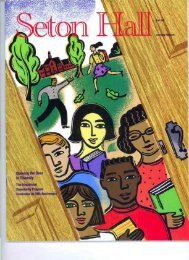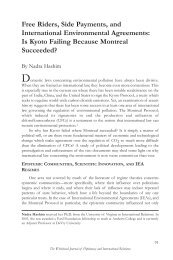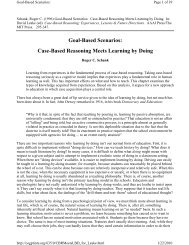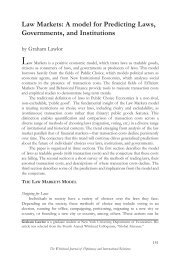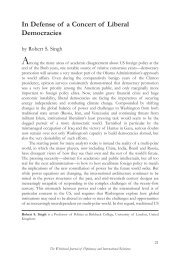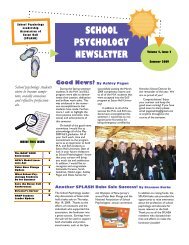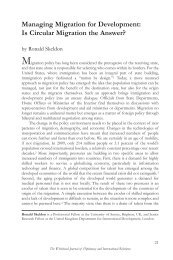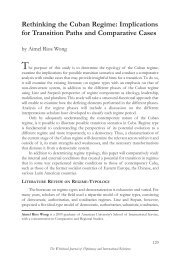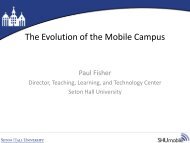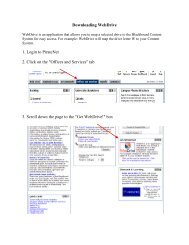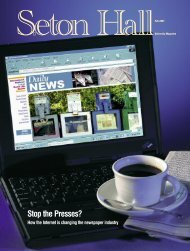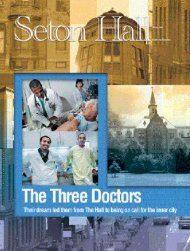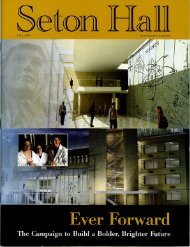Seton Hall Magazine, Summer 2001 - TLTC Blogs - Seton Hall ...
Seton Hall Magazine, Summer 2001 - TLTC Blogs - Seton Hall ...
Seton Hall Magazine, Summer 2001 - TLTC Blogs - Seton Hall ...
Create successful ePaper yourself
Turn your PDF publications into a flip-book with our unique Google optimized e-Paper software.
The Dialogue is far from a theoretical<br />
exercise, according to Marilyn<br />
DiGiacobbe, the School’s associate<br />
dean for external affairs. “It is a living<br />
initiative that crosses the boundaries<br />
of continents and cultures and reaches<br />
deep into the layers of society, considering<br />
the role of each member and<br />
facet of society in resolving conflict,”<br />
she emphasizes.<br />
It is this global focus that drew<br />
<strong>Seton</strong> <strong>Hall</strong> to the initiative. “The<br />
goals of the Dialogue are directly<br />
linked to the mission of our School,”<br />
says DiGiacobbe, who learned of the<br />
initiative during a visit to the United<br />
Nations last spring. DiGiacobbe, who<br />
brought the idea back to <strong>Seton</strong> <strong>Hall</strong>,<br />
says the School’s involvement is a<br />
classic example of recognizing and<br />
seizing an opportunity. It also is<br />
closely linked to the School’s partnership<br />
with the United Nations<br />
Association of the United States of<br />
America (UNA-USA). This nonprofit<br />
organization is dedicated to furthering<br />
the United Nations’ mission and<br />
U.N. participation through education,<br />
research and dialogue.<br />
As Constantinou explains, “This is<br />
one of the many instances where the<br />
School is the beneficiary of our great<br />
relationship with the UNA. We collaborate<br />
very closely with its chairman,<br />
Ambassador Bill Luers, and our key<br />
liaison, Suzanne DiMaggio.”<br />
Inspired by the Dialogue, students<br />
are fostering a dialogue of their own.<br />
They have spearheaded a parallel<br />
project aimed at highlighting and<br />
celebrating the rich diversity at <strong>Seton</strong><br />
Graduate Student Facilitates Global Understanding<br />
Concern for human welfare, and<br />
the relief of global suffering,<br />
have always been an important<br />
part of Ben Waruta’s<br />
life. Waruta, along with<br />
five other graduate students<br />
in the School of<br />
Diplomacy and International<br />
Relations, has<br />
been actively involved as<br />
project assistant for the<br />
United Nations Year of<br />
Dialogue among Civilizations,<br />
ever since the project’s inception<br />
last year.<br />
The Dialogue involves discussion and<br />
research into various international issues<br />
such as ethnicity, conflict, health care and<br />
poverty; it also promotes awareness of those<br />
issues (see main story).<br />
A native of Kenya, Waruta attended the<br />
University of Nairobi and later transferred<br />
to Hardin-Simmons University in Texas.<br />
The second-born son of college professors<br />
(his father is a self-taught scholar), Waruta<br />
speaks of his family with pride. “My parents<br />
taught me the powerful impact a people<br />
can have when they’re committed to change,”<br />
Waruta says. “They gave me my first lessons<br />
in global affairs.” Both parents were active<br />
in the Kenyan revolution for independence.<br />
Waruta adds, “I often think of all they have<br />
fought for and realize that I have much to<br />
be thankful for … I must continue to advocate<br />
for change.”<br />
Waruta credits Robert Manley, J.D.,<br />
Ph.D., former director of graduate programs<br />
in the School of Diplomacy (now professor<br />
emeritus) for his decision to enroll at the<br />
University in Fall 1999. “The <strong>Seton</strong> <strong>Hall</strong><br />
program in international relations combines<br />
education with practical experience,” Waruta<br />
explains. “I admired Dr. Manley’s spirit. After<br />
my initial visit with him, I felt that this would<br />
be a place where great minds are valued.”<br />
As project assistant, Waruta brainstorms<br />
about critical global issues and arguments<br />
on diversity, the global economy and the<br />
increasingly divisive relationship between big,<br />
influential countries and smaller ones. He then<br />
presents the information to the project organizers,<br />
and the project’s Group of Eminent<br />
Persons, who debate and further augment<br />
position papers for the Dialogue.<br />
U.N. Secretary-General Kofi Annan, in<br />
his address to the <strong>Seton</strong> <strong>Hall</strong> community on<br />
February 5, said, “The United Nations itself<br />
was created in the belief that dialogue can<br />
triumph over discord, that diversity is a universal<br />
virtue and that the peoples of the world<br />
are far more united by their common fate<br />
BY DENNISSA BROWN ’01<br />
Ben Waruta<br />
than they are divided by their<br />
separate identities.” Waruta<br />
believes that with the work of<br />
the Secretariat, a constructive,<br />
focused global dialogue<br />
can be achieved.<br />
“Diversity should not be<br />
a threat … it should be<br />
embraced,” Waruta says.<br />
“The Dialogue is not<br />
mere words alone, but a<br />
basis for meaningful action,”<br />
the graduate student continues.<br />
“This is not the kind of work I can<br />
leave at the office. These issues are<br />
important to me, especially when we talk<br />
about Africa.” Waruta speaks passionately<br />
about the many problems plaguing the<br />
African continent and feels a personal obligation<br />
to his native Kenya. “I am saddened by<br />
the poverty,” he explains. “There is the AIDS<br />
epidemic, poor health care and corrupt governance.<br />
Some problems overshadow others,<br />
such as genocide in Rwanda, which resulted<br />
in almost a million lives lost, and we all<br />
watched it happen. But when I see the hope<br />
in the eyes of the people — that makes me<br />
even more compelled to do something to<br />
make a difference, even in some small way.<br />
I guess that’s why this Dialogue has so much<br />
significance for me.”<br />
Waruta believes that the Dialogue project<br />
will increase the world’s awareness of the<br />
School. “The School’s leaders are active in<br />
getting out the message,” he says. “This<br />
program has quality students, quality instruction<br />
and projects, and provides students with<br />
quality experience.”<br />
After he graduates next May, Waruta<br />
hopes to work in the field of international<br />
business affairs, fostering mutually beneficial<br />
business collaborations between big countries<br />
and less developed ones. He strongly<br />
believes that in today’s international society,<br />
corporations should make global responsibility<br />
a top priority. “It is important to know how<br />
to manage across cultures. Businesses need<br />
to be more socially responsible; they should<br />
have the courage to make fair and inclusive<br />
decisions, and they should be held accountable<br />
for actions that could have negative<br />
impact on the citizens of the world,” he says.<br />
As Waruta makes plans to continue to<br />
promote dialogue, respect and participation<br />
in a global community, he looks forward<br />
to working with his <strong>Seton</strong> <strong>Hall</strong> colleagues.<br />
“I have a strong feeling that we will be working<br />
together on future issues that mean so<br />
much to us,” he says. “<strong>Seton</strong> <strong>Hall</strong> has already<br />
helped us to foster a better world.”<br />
SUMMER <strong>2001</strong> 19



